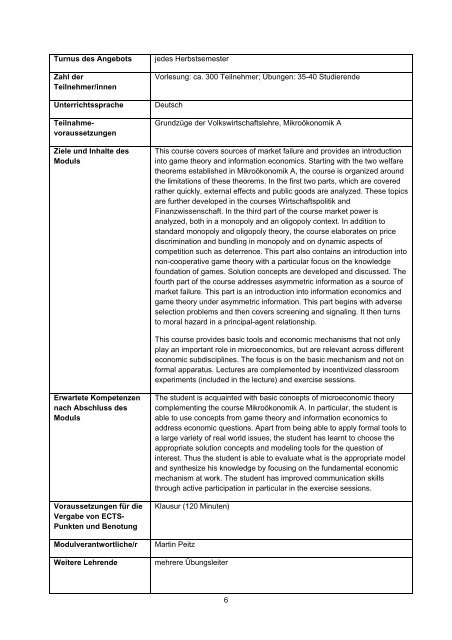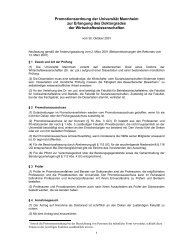Modulkatalog - Abteilung VWL - Universität Mannheim
Modulkatalog - Abteilung VWL - Universität Mannheim
Modulkatalog - Abteilung VWL - Universität Mannheim
Sie wollen auch ein ePaper? Erhöhen Sie die Reichweite Ihrer Titel.
YUMPU macht aus Druck-PDFs automatisch weboptimierte ePaper, die Google liebt.
Turnus des Angebots jedes Herbstsemester<br />
Zahl der<br />
Teilnehmer/innen<br />
Unterrichtssprache Deutsch<br />
Teilnahmevoraussetzungen<br />
Ziele und Inhalte des<br />
Moduls<br />
Erwartete Kompetenzen<br />
nach Abschluss des<br />
Moduls<br />
Voraussetzungen für die<br />
Vergabe von ECTS-<br />
Punkten und Benotung<br />
Vorlesung: ca. 300 Teilnehmer; Übungen: 35-40 Studierende<br />
Grundzüge der Volkswirtschaftslehre, Mikroökonomik A<br />
This course covers sources of market failure and provides an introduction<br />
into game theory and information economics. Starting with the two welfare<br />
theorems established in Mikroökonomik A, the course is organized around<br />
the limitations of these theorems. In the first two parts, which are covered<br />
rather quickly, external effects and public goods are analyzed. These topics<br />
are further developed in the courses Wirtschaftspolitik and<br />
Finanzwissenschaft. In the third part of the course market power is<br />
analyzed, both in a monopoly and an oligopoly context. In addition to<br />
standard monopoly and oligopoly theory, the course elaborates on price<br />
discrimination and bundling in monopoly and on dynamic aspects of<br />
competition such as deterrence. This part also contains an introduction into<br />
non-cooperative game theory with a particular focus on the knowledge<br />
foundation of games. Solution concepts are developed and discussed. The<br />
fourth part of the course addresses asymmetric information as a source of<br />
market failure. This part is an introduction into information economics and<br />
game theory under asymmetric information. This part begins with adverse<br />
selection problems and then covers screening and signaling. It then turns<br />
to moral hazard in a principal-agent relationship.<br />
This course provides basic tools and economic mechanisms that not only<br />
play an important role in microeconomics, but are relevant across different<br />
economic subdisciplines. The focus is on the basic mechanism and not on<br />
formal apparatus. Lectures are complemented by incentivized classroom<br />
experiments (included in the lecture) and exercise sessions.<br />
The student is acquainted with basic concepts of microeconomic theory<br />
complementing the course Mikroökonomik A. In particular, the student is<br />
able to use concepts from game theory and information economics to<br />
address economic questions. Apart from being able to apply formal tools to<br />
a large variety of real world issues, the student has learnt to choose the<br />
appropriate solution concepts and modeling tools for the question of<br />
interest. Thus the student is able to evaluate what is the appropriate model<br />
and synthesize his knowledge by focusing on the fundamental economic<br />
mechanism at work. The student has improved communication skills<br />
through active participation in particular in the exercise sessions.<br />
Klausur (120 Minuten)<br />
Modulverantwortliche/r Martin Peitz<br />
Weitere Lehrende mehrere Übungsleiter<br />
6















